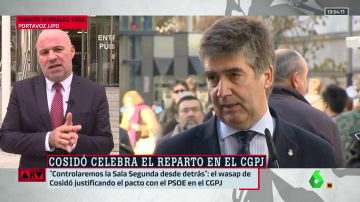Ignacio gonzalez vega wikipedia
The future of europe: opportunities in the face of challenges
Ignacio Ubaldo González Vega, a member of Judges for Democracy and a board member of the association of European Magistrates for Democracy and Freedoms (MEDEL), has 54 endorsements within the judiciary. González Vega, who has distinguished himself for his defense of the so-called universal justice – the prosecution of crimes against humanity beyond the borders of the country where they were committed – signed a manifesto together with eighty other magistrates, including the late José Manuel Buján, against the prosecution for prevarication of the former judge of the Audiencia Nacional Baltasar Garzón.
The Asturians will have to compete with candidates of the stature of the magistrate of the National Court Fernando Grande-Marlaska, María Tardón Olmos or José Antonio Ballestero Pascual, of the Civil Criminal Chamber of the Superior Court of Galicia. The list also includes Celima Gallego from Astorga, lawyer of the CGPJ and wife of the former Minister of the Interior and Defense José Antonio Alonso, who has 77 endorsements, or the wife of the former Attorney General of the State Cándido Conde Pumpido, Clara Martínez de Careaga, with 99 endorsements.
Interview with ignacio gonzález vega | los desayunos de
-Because in the end the Government tries to control the levers of the State and among them the judiciary, which has a relevant role in controlling the abuses of power and guaranteeing the rights of citizens. The Government tries to control it so that it is docile to its wishes.
-I think that this Government in particular, but in general all of them try to control the judiciary, the control bodies, there is a colonization of the political parties in the institutions. And not only in the CGPJ, where there is a partisan politics, but also in the Constitutional, in the RTVE council…. All the bodies that exercise control try to be colonized by the political parties. But I believe that the current government is even less respectful.
-Its original function was to defend the independence of judges in the exercise of their jurisdictional function. But there have been intolerable attacks by political leaders and the Council has not come to the defense of these judges, who limit themselves to exercising their function. It is one thing for judicial decisions to be subject to the criticism of the citizens, but it is quite another thing to make attacks in which the work of judges is called into question.
Juan carlos i – special news report complete | rtve
The progressive association Judges for Democracy (JpD), which last June 2 and 3 held its 31st Congress in Valladolid under the slogan «New times, new proposals. Rights, freedoms and guarantees», elected a new Secretariat and a new spokesman: Ignacio González Vega, magistrate of the 20th Criminal Court of Madrid.
One of the main objectives of the Secretariat of JpD for this mandate that has just begun is the achievement of a State Pact for Justice. In line with what was agreed last December with the Professional Association of the Judiciary, the Association of Judges Francisco de Vitoria and the Independent Judicial Forum.
Regardless of the ups and downs and political interests, JpD considers essential a great agreement involving all political groups with parliamentary representation, the various professional groups of Justice, trade unions and civil society.
On the other hand, among the proposals approved in the recently held Congress are, in the civil field, the legislative, institutional and social intensification for the protection of consumers, self-employed, SMEs, with respect to bank creditors and others with whom there is no real equality of negotiation.
The end of a unique trial in spanish democracy: ¿ha
In this context, he pointed out that many times «the media spectacle» is more important than truthful information: «Star judges are a figure that is much loved by journalists and sometimes they forget about those who stay in their offices», he said.
An issue that, in the magistrate’s opinion, influences the perception that citizens have of justice is the «training of journalists», since «in general, they do not have adequate knowledge to deal with judicial issues, and above all, they usually present a lack of precision in the use of legal language».

